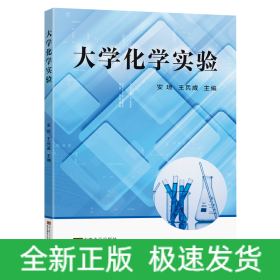
大学化学实验(College Chemistry Experiments)(胡宝山)(英文版)
全新正版 急速发货
¥ 25.7 6.8折 ¥ 38 全新
库存10件
作者胡宝山 主编 陈刚、李哲峰 副主编
出版社化学工业出版社
ISBN9787122450272
出版时间2024-03
装帧平装
开本16开
定价38元
货号29695960
上书时间2024-12-26
- 在售商品 暂无
- 平均发货时间 14小时
- 好评率 暂无
- 最新上架
商品详情
- 品相描述:全新
- 商品描述
-
前言
Chemistry is a central discipline that supports and advances almost all fields of science and technology in modern society. Chemistry experiments pave the way for understanding the fundamental theory of chemistry and innovating the development of chemistry as a science. In this regard, the course “College Chemistry Experiments” has become one of the basic courses for college students who engage in chemistry and chemistry-related majors to train them in thinking, observing, analyzing, practicing, and other comprehensive abilities that support them to consolidate their knowledge system.
To achieve “Building a community with a Shared Future for Mankind”, the internationalization of education must be carried out to cultivate the international competence of students in higher education. In addition to improving English proficiency, textbooks for some major courses facilitate minimizing the gap between language and major. Against this background,textbooks for “College Chemistry Experiments” in English are beneficial for inspiring teachers and students with more vision in the world.
The textbook highlights the following features:
Modularizing the experimental content according to chemical theory;
Interlinking the research background and the frontier;
Simplifying the description of experimental procedures for self-directed practice;
Underlining the processing and analysis of experimental data for scientific training;
Emphasizing the experimental safety and discussion of the results.
In agreement with the “Basic Requirements for Teaching Basic Chemistry Courses” formulated by the Steering Committee for Teaching Basic Chemistry Courses in Higher Education Institutions of the Ministry of Education, the textbook coordinates with two Chinese textbooks, College Chemistry (edited by Mengyu Gan and Yunhuai Zhang) and College Chemistry Experiments (edited by Zequan Li and Danmei Yu), and the overall content is organized into five chapters. Chapter 1 introduces the basic requirements of chemistry experiments in terms of experimental safety and the principle of data processing. Chapter 2 describes the commonly used instruments and their basic operation principles. In Chapter 3, the experimental contents are presented in four parts: chemical thermodynamics, chemical reaction kinetics, electrochemistry, analytical test. In Chapters 4 and 5, comprehensive experiments and research-oriented experiments are designed to train the comprehensive skills in chemistry experiments.
The textbook was chiefly handled by Baoshan Hu, with the following authors collaborated: Yan Jin, who edited sessions 1.1, 1.2, and 3.4.2; Gang Chen, one of the associate editors who edited sessions 1.3, 2.1, 3.3.2, 3.3.3, and 3.4.1; Ping Luo, who edited sessions 2.2, 3.1.1, 3.1.4, 3.3.1, 3.4.4; Huanbao Fa, who edited sessions 2.3, 3.1.3, 3.3.4, 4.3; Zhefeng Li, one of the associate editors who edited sessions 2.4, 3.2.1, 3.2.2, 4.1, 5.1, and appendix; Danmei Yu, who edited sessions 3.1.2, 3.4.3, 4.2, 5.3; Baoshan Hu, the editor-in-chief who organized all the contents and edited sessions 3.2.3, 3.2.4, 5.2.
It is the teaching practice and teaching achievements of the teacher team of college chemistry at Chongqing University that contribute to the benchmark for the edition of this textbook. All authors acknowledge Prof. Zidong Wei and Prof. Mengyu Gan for their valuable guidance on the edition. All authors would like to express sincere appreciation to the students, whose enthusiasm and curiosity have always inspired us, and whose questions and suggestions have always helped us. Moreover, all authors are grateful for the valuable experiences and textbooks from our sister colleges as references to enhance our teaching ability.
We sincerely welcome all valuable suggestion and advice to improve this textbook since we have faced with limited knowledge and inevitable mistakes.Authors
January 2024
导语摘要《大学化学实验》(英文版)在介绍实验安全规则、常规实验设备及其基本操作的基础上,聚焦化学热力学实验、化学动力学实验、电化学实验、分析测试实验、综合实验、研究型实验等六个大学化学实验涵盖的典型模块,精选了22 个实验。每个实验包含原理简介、实验设备和试剂、实验内容和操作步骤、实验结果记录与分析、注意事项、问题与讨论等部分。本书紧扣理论教学内容知识重点,紧密衔接化学基础知识和实践知识,实验项目代表性强,既可锻炼学生的基本操作能力,也可加深理论与实践之间的联系。《大学化学实验》(英文版)可作为高等理工院校化学相关专业本科生的教材,可以配套《大学化学》《普通化学》《工科大学化学》等化学类公共基础课程和教材的全英文实验教学要求。
作者简介胡宝山,博士/博士后,重庆大学化学化工学院副院长,重庆市引进高层次人才。重庆市新材料研发创新英才。重庆市石墨烯制造业创新中心(重庆市经信委)、重庆市石墨烯产业技术创新联盟(重庆市经信委)专家委员会成员。 “化工过程强化与反应”国家地方联合工程实验室研究骨干。国家 级精品课程资源共享平台《大学化学》课程主讲教师。参编《大学化学》、《大学化学实验》国家精品资源共享课程系列教材。荣获宝钢教育基金会优秀教师奖、唐立新奖教金、重庆市教学成果奖二等奖(排名四)、重庆大学自然科学一等奖(排名二)等。研究领域为碳纳米材料物理化学、电子器件、能源环境催化等交叉方向。
目录Chapter 1 General Experimental Rules 1
1.1 Lab Safety Rules 1
1.1.1 Chemicals 1
1.1.2 Instruments . 2
1.1.3 Accident Protocol 2
1.1.4 Safety Treatment of Chemical Wastes . 3
1.1.5 Working Principles of Green Chemistry 4
1.2 Experimental Rules 4
1.2.1 Experimental Requirements . 4
1.2.2 Experimental Rules for Students 5
1.3 Data Analysis Rules 7
1.3.1 Significant Figures . 7
1.3.2 Precision and Accuracy 11Chapter 2 Common Instruments and Basic Operation 13
2.1 Analytical Balances 13
2.1.1 Electronic Analytical Balance . 13
2.1.2 Photoelectronic Analytical Balance . 14
2.2 Solution Preparation 17
2.2.1 Solution Measurement . 17
2.2.2 Basic Instruments and Operating Methods . 20
2.2.3 Titration Operating . 24
2.3 Preparation and Purification 26
2.3.1 Preparation and Collection of Gases 26
2.3.2 Recrystallization 27
2.4 Analysis and Testing 29
2.4.1 Spectrophotometer . 29
2.4.2 pH Meter 33
2.4.3 Potentiometer Electronic Balance . 35
2.4.4 Conductivity Meter 36
2.4.5 DC Stabilized Power Supply 39Chapter 3 Basic Experiments 42
3.1 Thermodynamic Experiment 42
3.1.1 Determination of Isobaric Thermal Effect 42
3.1.2 Determination of Ideal Gas Constant . 47
3.1.3 Determination of Ionization Constant . 51
3.1.4 Determination of Solubility Product Constant 55
3.2 Reaction Kinetic Experiment 60
3.2.1 Reaction Rate and Influencing Factors 60
3.2.2 Determination of Reaction Order 64
3.2.3 Conversion Rate of Sucrose to Fructose 68
3.2.4 Influence of Catalyst on Reaction Rate 73
3.3 Electrochemical Experiment 79
3.3.1 Voltaic Cell and Electrode Potential 79
3.3.2 Surface Treatment of Metal Materials . 86
3.3.3 Manufacture of a Printed Circuit Board . 90
3.3.4 Electrochemical Corrosion 93
3.4 Analytical Test Experiment 97
3.4.1 Determination of Nitrogen Oxides 97
3.4.2 Determination of Water Hardness 100
3.4.3 Purification and Content Determination of Cupric Sulfate Crystals 106
3.4.4 Determination of COD in Water (Permanganate Index) 110Chapter 4 Comprehensive Experiments 115
4.1 Treatment of Chromium-Containing Wastewater 115
4.2 Preparation and Characterization of Ferrous Sulfate Amine 118
4.3 Determination of the Molecular Weight of Glucose(Freezing point reduction method) 121Chapter 5 Research Experiments 127
5.1 Preparation and Fluorescence Property of Luminescent Materials 127
5.2 Preparation of Single-crystal Material by the Hydrothermal Method 129
5.3 Assembly and Testing of Lithium Ion Batteries 134REFERENCES 137
APPENDIX 139
内容摘要《大学化学实验》(英文版)在介绍实验安全规则、常规实验设备及其基本操作的基础上,聚焦化学热力学实验、化学动力学实验、电化学实验、分析测试实验、综合实验、研究型实验等六个大学化学实验涵盖的典型模块,精选了22 个实验。每个实验包含原理简介、实验设备和试剂、实验内容和操作步骤、实验结果记录与分析、注意事项、问题与讨论等部分。本书紧扣理论教学内容知识重点,紧密衔接化学基础知识和实践知识,实验项目代表性强,既可锻炼学生的基本操作能力,也可加深理论与实践之间的联系。《大学化学实验》(英文版)可作为高等理工院校化学相关专业本科生的教材,可以配套《大学化学》《普通化学》《工科大学化学》等化学类公共基础课程和教材的全英文实验教学要求。
主编推荐胡宝山,博士/博士后,重庆大学化学化工学院副院长,重庆市引进高层次人才。重庆市新材料研发创新英才。重庆市石墨烯制造业创新中心(重庆市经信委)、重庆市石墨烯产业技术创新联盟(重庆市经信委)专家委员会成员。 “化工过程强化与反应”国家地方联合工程实验室研究骨干。国家 级精品课程资源共享平台《大学化学》课程主讲教师。参编《大学化学》、《大学化学实验》国家精品资源共享课程系列教材。荣获宝钢教育基金会优秀教师奖、唐立新奖教金、重庆市教学成果奖二等奖(排名四)、重庆大学自然科学一等奖(排名二)等。研究领域为碳纳米材料物理化学、电子器件、能源环境催化等交叉方向。
相关推荐
— 没有更多了 —






















以下为对购买帮助不大的评价